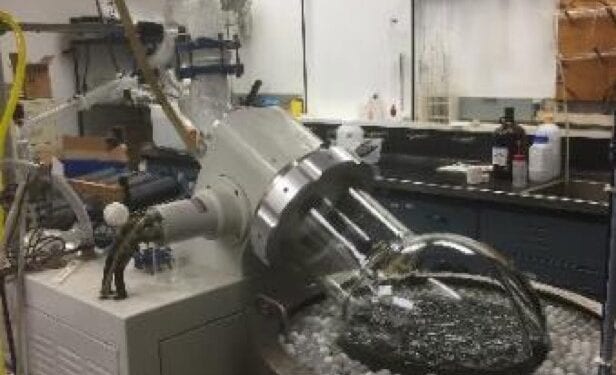Plans In Place To Expand Size Of Pilot Plant
Clean lithium developer Lake Resources NL (ASX:LKE) has revealed further positive high purity results from tests carried out at Hazen Research Inc’s world renowned independent process laboratory.
Lake’ technology partner, Lilac Solutions Inc., has already demonstrated the production of high purity lithium chloride eluate using its proprietary ion-exchange direct lithium extraction method (DLE) at pilot plant module scale in California.
Samples of this lithium chloride were further processed into lithium carbonate by Hazen in Colorado, USA.
Hazen conducted a series of tests aimed at optimizing lithium carbonate quality while maintaining a simple flowsheet. Conventional treatment methods, including evaporation, treatment with sodium hydroxide and soda ash, ion exchange, and precipitation, were used.
This process optimisation was a critical step prior to production of larger volumes of high purity lithium carbonate samples.
The tests at Hazen establish that very high purity 99.97% lithium carbonate with low impurities can be produced from Kachi brines.
To ensure accuracy, a number of analytical techniques were employed to verify the lithium carbonate grade and the low impurities levels including inductively coupled plasma spectrometry and titration, both of which are accepted assaying techniques.
Very Low Impurities Samples produced by Hazen show a 70% reduction in the overall level of impurities compared to Lake’s earlier lithium carbonate production (99.9% lithium carbonate) and a significant 94% reduction in impurities compared with 99.5% lithium carbonate, widely accepted as “battery grade” in the current market. N
otably, the results include very low metal and cation impurities including iron (Fe) and boron (B). Lake expects this product to be highly attractive for the lithium-ion battery market where low impurities is a key factor in determining battery quality.
Pricing in the lithium carbonate market is largely determined by lithium carbonate grade and the level and type of impurities. The results achieved by Lilac and Hazen with Kachi brine suggest the potential to achieve substantially higher prices than previously envisaged. The Pre-Feasibility Study (PFS) was based on achieving 99.9% lithium carbonate and a fixed selling price of US$11,000/t.
Hazen will continue to produce lithium carbonate samples over the coming weeks, targeting 5kg to 6kg in this round. Samples will be sent to Novonix Limited to be tested together with commercial battery cathode precursor materials in NMC622 batteries.
Novonix is currently developing “million mile” battery technologies with revolutionary anode and cathode materials. Samples will also be sent to other potential off-take partners in Asia and Europe.
Lilac’s pilot plant module treatment of Kachi brine to produce lithium chloride solution was conducted at roughly 1,000x the earlier laboratory bench-scale tests.
The scale-up from the pilot module to full production scale modules is expected to be a relatively small, 3-5 times, depending on the final module design. The PFS was based on utilizing a series of modules to produce 25,500 tonnes per annum lithium carbonate equivalent. These successful pilot module tests from brine to final product, provide the confidence to replicate the results at planned production scale. Further, the use of direct lithium extraction as designed by Lilac, allows for consistent product quality and for ready production scalability.












